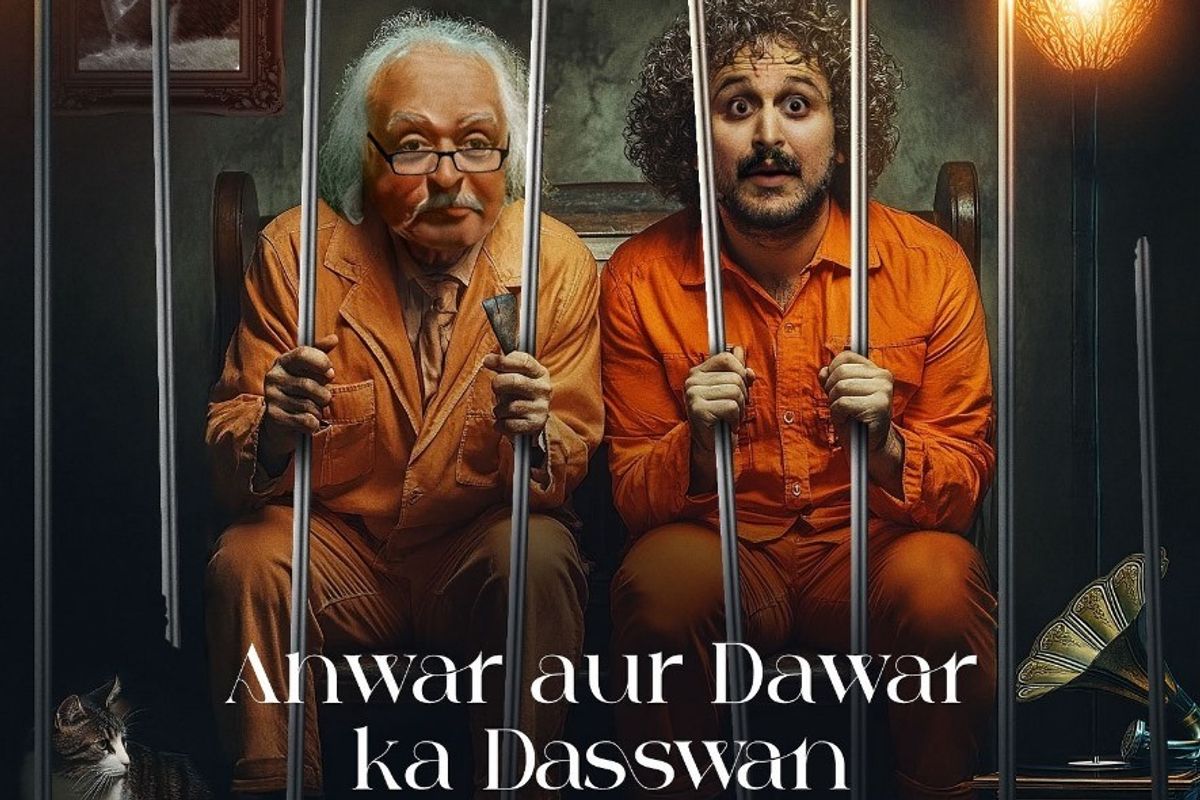What to expect from Anwar aur Dawar ka Dasswan
Renowned playwright Anwar Maqsood’s upcoming play marks his tenth collaboration with Dawar Mehmood

Omair Alavi
Lifestyle and Entertainment Editor
Omair is an experienced entertainment journalist who loves to dabble in sports from time to time. His bylines have appeared in leading Pakistani newspapers and has had the chance to interview international celebrities besides Pakistani actors.

Anwar Maqsood and Dawar Mehmood are collaborating for the tenth time.
- The veteran playwright returns to the stage with his tenth play after a two-year-long hiatus
- Dawar Mehmood directs, marking 13 years of collaboration with Anwar Maqsood
- Anwar Maqsood and Dawar Mehmood have delivered more hits than misses
Anwar Maqsood’s name is synonymous with quality writing across platforms and genres. The master satirist has dominated TV for over 50 years and has delivered more hit projects than his contemporaries.
He was part of the core team behind the iconic Fifty Fifty, followed by Silver Jubilee, Aangan Terha, Show Time, Commercial Time, Studio Dhai, Studio Pawnay Teen and Loose Talk, which remain popular despite airing over a decade ago.
He didn’t limit himself to comedy and satire but also penned the scripts of serious long plays Duar e Junoon, Mirza and Sons and drama serials Sitara Aur Mehrunnisa and Colony 52.
It was in 2012 that the legendary playwright decided to try his hand at writing plays for stage, a move that made him relevant to a new generation. All of his nine plays were directed by Dawar Mehmood and produced by his Kopykats Productions, and the tenth isn’t going to be any different.
The untitled play was recently teased on social media by Dawar Mehmood and even though both he and Anwar Maqsood were shown to be sitting behind bars, they’ll need more than that to draw audiences to the theatre to watch their play.
Why audience could be skeptical of the new play
In the last 12 years, Anwar Maqsood and Dawar Mehmood’s team has produced nine plays: seven were massive hits, while two were forgettable. Sadly, these two plays were among his last four attempts, leaving some of the audience skeptical about the tenth
The pandemic can also be termed as one of the reasons why theatre hasn’t picked up in the last two years. Before it was over, the audiences were scared of entering a theatre, and after it was over, they were unsure whether things would return to normal anytime soon.
However, the next Anwar Maqsood – Dawar Mehmood play can change all that, and bring the audience back to the theatre with a quality play. They would have to make sure that they don’t make fun of historical figures, don’t let the audience get bored and avoid item numbers, which don’t suit Anwar Maqsood’s style.
Since the upcoming play is his tenth with Kopykats Productions, a look back at the previous nine would help the audience remember his great, average, and forgettable plays.
It began with the great ones
Pawnay 14 August was the play that gave a new lease of llife to Karachi's theatre in general, and Pakistan's theatre in particular. It came out in 2012 and changed the perception of the Arts Council in Karachi, because it was a well-written, well-thought-out and well-acted play. Not many know but the central idea was derived from Anwar Maqsood's TV play Wapsi where Quaid-e-Azam Mohammad Ali Jinnah, Allama Iqbal, and Moulana Shaukat Ali were stuck at an airport.
Similarly, Pawnay 14 August took place at an airport, and Omar Sultan, Talat Jilani, and Aamer Agha played the three main characters - Jinnah, Iqbal, and Shaukat Ali respectively. They meet many different characters from modern Pakistan including a politician, an air hostess, a school teacher, and a Bengali stuck in former West Pakistan, and they all had a story to tell.
Some made the audience laugh out loud, others made them sad, but on the whole, the play changed the dynamics of theatre in the country. It was so popular that within a year it was reproduced with different actors but with the same intensity.
Aangan Terrha came next and gave us future stars like Yasir Hussain, Hareem Farooq and Usman Mukhtar. While Yasir played Akbar and Hareem Farooq was Jahan Ara, Usman Mukhtar had a minor role which made its presence felt at the climax. The play was the stage version of Anwar Maqsood's hit 80s TV serial Aangan Terha where Shakeel played Mehboob Ahmed, Bushra Ansari was Jahan Ara while Salim Nasir immortalized Akbar in the viewers' minds.
The super successful play was staged in Karachi, Lahore and Islamabad and was followed by Sawa14 August , the second part of the August trilogy. Zahid Ahmed and Gohar Rasheed made their debut in the drama as Quaid e Azam Mohammad Ali Jinnah and General Zia ul Haq, while Wassam Waheed portrayed Zulfiqar Ali Bhutto.
It wouldn't be incorrect to say that by that time, Sawa 14 August was one of the best creations from Anwar Maqsood's pen. He gave all three characters equal importance, a hallmark of his writing. The icing on the cake was the masterful performances of the three actors who were so brilliant in their portrayals that they would have made their characters proud.
The next play Anwar Maqsood and Dawar Mehmood collaborated on was the playwright's famous Haaf Playt where Moin Akhtar, Khalida Riyasat, Jamshed Ansari, Badar Khalil, Latif Kapadia, and Arshad Mehmood played important roles. More than one and a half a decade later, Yasir Hussain and Mariam Saleem Nawaz reprised the roles of Moin Akhtar and Khalida Riyasat, while Zahid Ahmed and Gohar Rasheed played supporting yet important characters.
What made Siachen one of the better Anwar Maqsood - Dawar Mehmood collaborations was the fact that the performances were so perfect that the audience felt as if they were sitting in the mountains, not in the auditorium. Yasir Hussain led the cast in the patriotic play (he was replaced by Hasan Raza later on) while Mohsin Ejaz, Saad Farrukh Khan, Fareeha Razzak and Taha Humayun appeared in supporting characters that left a long-lasting impression.
Siachen was so popular in Karachi that it broke the record set by Aangan Terrha and went onto stage 104 shows in the city. Anwar Maqsood’s dialogues and Dawar Mehmood's direction had the audience alternate between raucous laughter or unstoppable tears.
Then came the average ones
While Anwar Maqsood was churning hits for the Arts Council, he asked me when would I give him a bad review, to which I said that day would come when he would disappoint me. Anwar Maqsood Ka Dharna didn't disappoint me but it wasn't as good as the earlier plays. I had the honor of watching the play from the sidelines with Anwar Maqsood in a jam-packed theatre and although he was pleased with the attendance, he wasn’t supposedly happy with the changes to the script.
That's why when he asked me to judge the better line in his next play Kyon Nikala, I knew that he didn't approve of the changes. Thankfully, I laughed at Anwar Maqsood’s original lines, not the changes, which is why the play didn't disappoint like later ones.
In Anwar Maqsood Ka Dharna, Noor ul Hassan played a talk show host who interviewed politicians ahead of the elections, whereas Sajid Hasan played a politician in Kyon Nikala who was gearing up for the general election but no party wanted to give him a ticket.
Finally, the forgettables!
One day out of the blue, Anwar Maqsood asked me to visit his place and listen to a play's narration, which was at that time known as a prequel to Aangan Terrha. However, when I watched Naach Na Janay a few days later, I learned that the story he narrated to me was not part of the script and what the audience got was a rehashed version of Aangan Terrha. The only difference was that there were a few songs where choreographer Wahab Shah performed when in fact Akbar's character should have danced.
No one knows what went wrong with Naach Na Janay; some say that Anwar Maqsood decided to pull the plug because of constant changes, while others feel it was always supposed to be like the final product. Three years later, Saadhay 14 August had everything wrong about it, and it would have been better had it never been staged.
Unlike Anwar Maqsood's other stage plays where he gave respect to the main characters, Saadhay 14 August made fun of Indian leader Mahatma Gandhi, a fact that must have alerted the Dubai promoters who didn't stage the play like its predecessors. Three actors played Quaid e Azam Mohammad Ali Jinnah and none of them were as good as Omer Sultan or Zahid Ahmed.
The script was constantly changed and despite watching the play twice, I couldn't muster the courage to face either the writer or the director. What would I have said after watching a lame item number, a cheap take on Manto by students, and Gandhi hovering around women inappropriately, like a lovesick teenager?
One can only hope that their next play makes up for the disappointments and gives the audience back the Anwar Maqsood they love. After all, he is the greatest playwright of the last three generations and even though some wannabes don't rate him highly, they should consider themselves lucky for being alive in the same era as him.










Comments
See what people are discussing